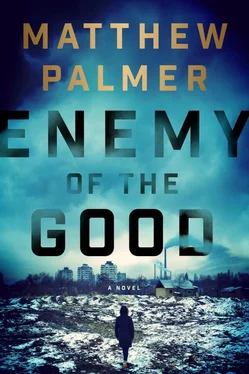Instead, she went the other way. There was a small storeroom in the basement where Temir kept supplies for his restaurant, Café Manas. A few weeks earlier, Zamira had stopped by the café for a drink. Temir, a friend of long-standing, had hurt his back and he had asked her to help him bring some potatoes and parsnips up from the basement. In the corner of the storeroom there was a small pile of burlap bags. Under the bags was a trapdoor that concealed a storage bin for root vegetables. Down here, the fall harvest would keep more or less fresh through the long winter until spring. It was March and the bin would be almost empty. There should be enough room for one.
Zamira slipped as quickly and quietly as she could into the storage bin, doing her best to slide the burlap bags back into place as she closed the trapdoor. The potatoes she was lying on were soft and mushy and stank of rot. She hoped that there were no rats in the bin, not because she was afraid but because their scuttling might betray her hiding place.
The thumping of boots on the stairs told her that the police had found the door to the basement. There was a scream, followed by a wet smack that sounded to Zamira like a truncheon hitting flesh. The noise was muffled somewhat by the burlap bags that covered the cramped root cellar.
She concentrated on her breathing, in through the nose and out through the mouth. Slow and regular and, most important, quiet. There was a story she had read once by an American writer about a murderer who thought he could hear the heart of his victim beating under the floorboards of his house. Her own jackhammering heartbeat felt loud enough to be a telltale, and she willed it to slow. It obeyed reluctantly.
There was a creak as the door to the storeroom opened, followed by footsteps.
“Get the lights,” she heard a male voice say with the casual authority of someone used to giving orders. Zamira recognized the voice and a pulse of fear ran like acid through her veins. The language was Russian, but the accent was heavy and plodding, as though the liquid Russian phrases had congealed into something thick and greasy. It was Georgian, the accent of gangsters and Stalin. And there was only one man this could be. His name was Anton Chalibashvili. But Kyrgyzstan’s democrats and members of Bishkek’s intelligentsia had another name for him. Torquemada. The Inquisitor.
There was a room in the sub-basement of Prison Number One where the Georgian, a former KGB major who learned his trade at Moscow’s infamous Lubyanka prison, practiced his dark arts in the service of the Eraliev regime. It was called the Pit.
The Inquisitor’s job was to secure confessions by whatever means necessary. Everyone confessed in the end.
Zamira shuddered as her mind conjured up medieval fantasies of the Pit and its elaborate methods of torture. And as awful as the visions were, Zamira suspected that her imagination had fallen short of the realities.
A small part of the outline of the trapdoor lit up and Zamira knew that there was no more than a single layer of burlap covering that corner of her hiding place.
“Are you sure you saw her come in here?” the Inquisitor asked.
“I’m sure. There is nowhere else down here where she could be.”
Zamira recognized that voice as well. It belonged to a student named Aibek who had joined the group only a few months earlier. Aibek had demonstrated considerable promise as a future leader in the movement. He was smart, articulate, and passionate. He was also, it would seem, a traitor. It was the age-old problem of cabals, conspiracies, and underground movements. Who could you trust? Ultimately, yourself alone, and sometimes not even that.
Temir, she remembered, kept a tool in the storage bin, a steel poker with a fork at the end that could be used to help scoop out the beets, potatoes, and carrots. In the dark, with her enemies standing over her body, Zamira felt frantically around the sides of the bin until her fingers closed around the wooden handle of the tool. With her other hand, she tested the tips of the tines at the business end. They were sharp and the metal was strong. They would find her here, but she would drive the tool into Aibek’s reptilian brain before they put her down.
There was a scraping sound as someone—likely Aibek—dragged the burlap sacks off the trapdoor.
“Look what we have here,” she heard the traitor say.
“Open it.”
The light was bright, and the silhouette of Aibek’s head loomed over Zamira in sharp relief. She thrust the long fork up with all of her strength and had the satisfaction of feeling one of the tines pierce an eyeball as though it were a boiled egg. Warm, wet drops sprayed onto her hand and arm. Blood and ocular fluid.
Aibek screamed.
“My eye! Goddamn bitch blinded me.”
The traitor pulled his head back and Zamira’s second thrust hit nothing but air.
She crouched on the mash of rotten vegetables on the floor of the bin and raised her modest weapon to eye level. If she could take the Inquisitor in the throat or the groin, she could make a run for the stairs.
Aibek rolled helplessly on the floor, both hands pressed up against his left eye. He was whimpering like a dog and Zamira enjoyed a brief moment of satisfaction.
It was a fleeting sensation.
Chalibashvili would not be as careless as Aibek had been. He was not a young man; Zamira would have guessed that he was in his late fifties. But he carried himself with a military bearing and he exuded both confidence and competence. He was tall and broad and his gray hair was cut close to his scalp. He wore a dark suit under a knee-length leather coat that was open at the front. There was a black truncheon in one hand and Zamira could see the butt of a pistol in a holster on his hip.
Chalibashvili just watched as Zamira crawled out of the pit, his lips in an amused smirk.
It was as easy for him to take the weapon from her as it would have been to take a toy from an ill-behaved child.
The handcuffs he used to bind her hands behind her back were heavy and cold.
Chalibashvili led her up the stairs and out the front door, leaving his mole in their group writhing on the basement floor in pain and humiliation, his utility to the security services used up.
There was a black truck parked in front of the restaurant and Zamira’s colleagues were being loaded in the back.
Zamira looked up at the night sky. It was late and there were few lights to hide the stars. Her breath formed wispy clouds of vapor in the cold air.
“Yes.” Standing behind her, the Georgian whispered in her ear. “Look up. Drink in the sky. It will be a long, long time until next you see the stars.”
1

HAVANA
MARCH 1, 2016
The four people gathered in the Tank were judge and jury. The executioner already had his orders.
“It’s a death sentence,” Kate Hollister said, embarrassed by the note of pleading that she could not quite keep out of her voice. As happened so often she was the only woman in the room, and women, she knew, had to be careful about tone. Match the men for toughness and risk being branded a bitch. Speak elliptically and you were weak. Speak plainly and you were a shrew. Kate wanted desperately to hit just the right note. Get it wrong, and her friends were dead.
“I’m sorry, Kate. But Mike’s right. We can’t take action on what we know without risking the source.”
Читать дальше














